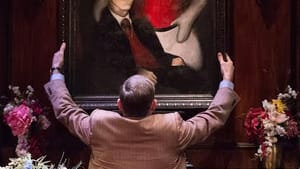Stay in the Loop
BSR publishes on a weekly schedule, with an email newsletter every Wednesday and Thursday morning. There’s no paywall, and subscribing is always free.
What would Dr. Phil say?
'Harvey' at the Walnut Street Theatre

Harvey is a pooka, a large mythical beast, in this case a 6′3″ white rabbit, played to perfection by, according to the program, Jack O’Hare, whose photo is sadly missing. Harvey, is the BFF of Elwood P. Dowd, played endearingly by Philly fave Ben Dibble in the production of the Pulitzer prize-winning play Harvey currently running at the Walnut Street Theatre.
Even before the show begins, Dibble runs around the theater in search of Harvey, handing out his card and telling us to “call the number on the bottom, not the top.” When the play begins, we meet Elwood’s family and understand why he might choose an imaginary friend in place of the relatives he’s got. His overly dramatic sister, Veta Louise Simmons (Mary Martello), longs for normalcy and acceptance in society, while his nymphomaniac niece Myrtle Mae (Ellie Mooney) hungers for a man; Elwood’s eccentricities have chased away all her suitors.
Elwood spends his days drinking at the local bar and embarrassing his family, but he’s rich, and they’re dependent on his generosity. They can think of only one solution: have Elwood committed to a nearby sanatorium. Philly stalwarts Greg Wood and Ian Merrill Peakes are the incompetent and egotistical doctors responsible for his care — they want to medicate him into an unpleasant normalcy — while his lawyer, Judge Omar Gaffney (H. Michael Walls), is the only one who seems to have his best interests at heart.
How’s that working for you?
Charming as the story is, there’s something off here. It’s easy to imagine Veta and Myrtle Mae on an episode of Dr. Phil with Veta complaining about her wastrel brother and Myrtle Mae explaining how he’s ruined her chances at ever finding a man. Dr. Phil’s usual solution would be to send the troubled soul off to a rehab facility, which is precisely what they’ve already tried to do.
Unfortunately, the alcoholism diagnosis doesn’t quite ring true. It’s hard to believe Dibble’s Elwood has been drinking most of the day when he seems such an uptight sober fellow. If he’s not a drunk, it would seem that he suffers from an undiagnosed mental illness. Of course, making comedy out of a disability doesn’t sit well with modern audiences — but with Harvey, serious issues are ignored in favor of the humor.
Still, Elwood isn’t as lost as he seems. Years ago, he says, his mother said he must be smart or pleasant. “Well, for years I was smart. I recommend pleasant,” he says, reassuring us that he’s more than capable of taking care of himself.
The set, by scenic designer Robert Koharchik, gets its own round of applause as the curtain rises. The ornate library of the Dowd mansion and the simpler walls of Chumley’s Rest sanatorium provide the perfect backdrop for the onstage antics.
The play is fun, but some choices don’t work well. Turning Duane Wilson (Dan Olmstead) into a heavy-handed thug is jarring rather than amusing, and his transition to romantic hero doesn’t feel right. Mooney’s over-the-top slapstick portrayal of Myrtle Mae, who walks into walls and talks in an artificial voice, lessens the impact of Elwood’s eccentricity.
Harvey won the Pulitzer Prize in 1945, given to “an original American play, performed in New York, which shall represent in marked fashion the educational value and power of the stage, preferably dealing with American life.” In other words, there’s a lesson to be learned here, and it seems to be about tolerance and acceptance. It’s a lesson that is still relevant today.
What, When, Where
Harvey. Written by Mary Chase, additional dialogue by Ken Ludwig. Bob Carlton directed. Through March 6, 2016 at Walnut Street Theatre, 825 Walnut St., Philadelphia. 215-574-3550 or walnutstreettheatre.org.
Sign up for our newsletter
All of the week's new articles, all in one place. Sign up for the free weekly BSR newsletters, and don't miss a conversation.
 Naomi Orwin
Naomi Orwin